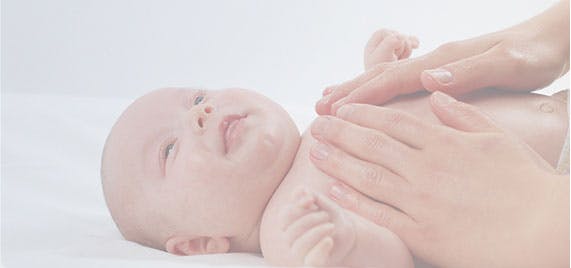
Tips & Advice for Eczema Prone Skin
Tips for Caring for your Baby's Eczema
Your baby's skin can become very dry and prone to irritation. Here are some tips to help relieve your baby’s very dry skin and ensure it remains soft and comfortable.

TIP FOR BATHTIME
Make hair washing fun and pretend your little one is caught in a rainstrom, then use the shower to rinse out their hair, Singing a rhyme will make it even more fun for you both.
Frequently Asked Questions
What is eczema?
A: Healthy skin contains fats and oils which help to maintain moisture by creating a protective layer.
In eczema prone skin, the cells don’t produce as many fats and oils and so retain less water. This leads to the protective layer being weaker, allowing irritants and allergens to enter the skin leading to irritation.
How much emollient should I use on my child?
A: Parents of children with
eczema should try to bathe their
child in an emollient wash
product once a day.
Emollient creams should be used
frequently; the weekly
recommended amount for children
is 250 g per week. On a day to
day basis, it is recommended to
apply an emollient cream at
least 3 to 4 times a day.
How should I treat dry and eczema prone skin?
A: The most common method of treatment is the use of emollients. Emollients are an essential treatment in eczema and dry skin conditions to moisturise the skin by soothing and softening. For more information on how to treat your child’s eczema please download our Guide to Managing Atopic Eczema. You should also speak to your pharmacist or doctor for advice.
How can I protect mine and my child’s skin during winter?
- Make sure the skin is moisturised using an oil-based moisturiser
- Wrap yourself and your child up so both of you are protected from the harsh environment that winter brings
- If you or your child has a dry skin condition including eczema use a gentle bath wash such as a bath additive. After washing use an emollient cream.
- Try not to overheat the skin once indoors as extremes in temperature can aggravate the skin.
- When drying after a bath or shower, pat your skin gently instead of rubbing the skin dry
What are the top tips for bathing a child with dry skin conditions including eczema
- Add a bath emollient to the water to help prevent the skin from drying out
- To keep the temperature as close to the bathroom air temperature as possible - changes in temperature can aggravate the skin
- Soak your child in the bath water for 10-20 minutes - try to avoid keeping them in bath longer as this may actually dry out the skin
- After bathing, apply an emollient cream to all areas of the skin to lock in the moisture
How do I stop my child with eczema from scratching during the night
- Try to keep their bedroom cool, but not too cold
- Use cotton sheets that have been washed with a sensitive skin detergent
- Apply an emollient cream about 20 minutes before bedtime to allow it to soak in to the skin
- Do not allow pets to sleep in the same room as your child
- Try to keep your child’s nails short so any scratching that does occur does minimal damage








